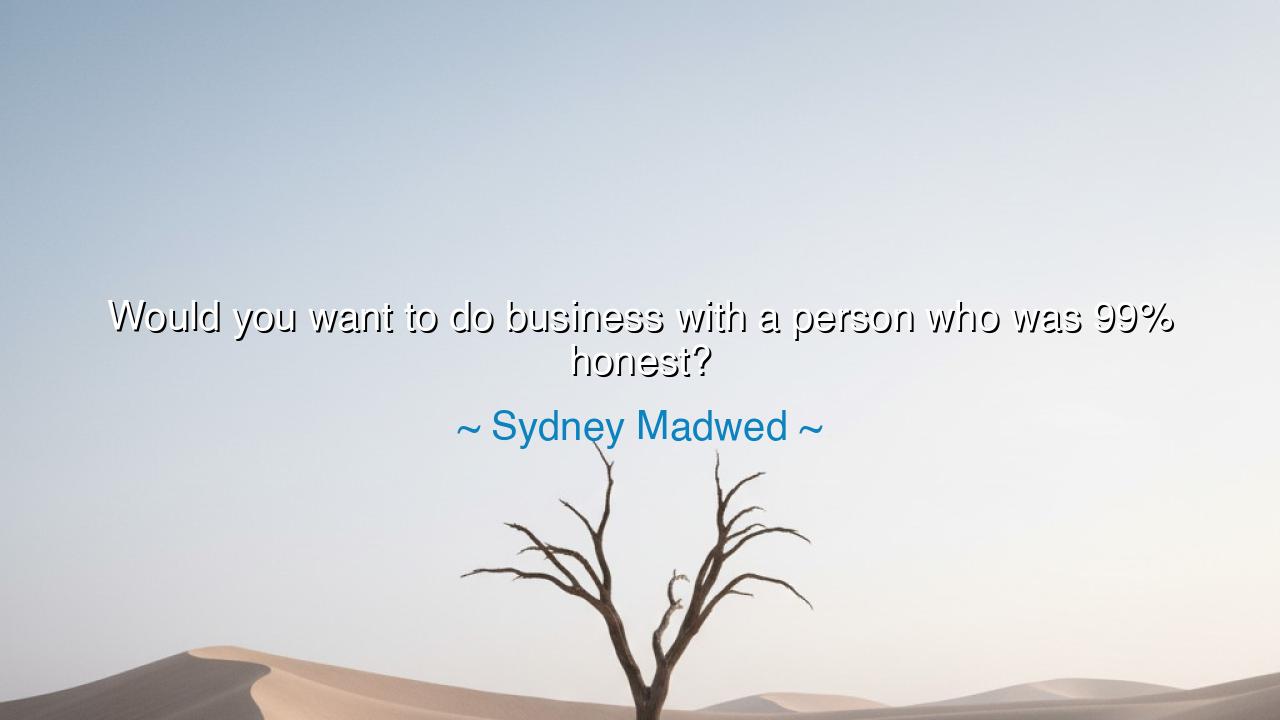
Would you want to do business with a person who was 99% honest?






The words of Sydney Madwed—“Would you want to do business with a person who was 99% honest?”—strike like a sharp blade into the heart of human dealings. They remind us that honesty is not a quality that can be measured by percentages, for its power lies in its wholeness. To be 99% honest is, in truth, to be dishonest, for trust once fractured, even in the smallest degree, becomes fragile and uncertain. Just as a chain is broken by a single weak link, so too is integrity undone by the smallest betrayal.
In this question lies the ancient wisdom that trust is absolute. No man would cross a bridge that was “99% safe.” No woman would drink water that was “99% pure.” Why then should we entrust our wealth, our labor, or our dreams to one whose honesty leaves room for deceit? For integrity is not a cloak worn part-time, nor a candle half-lit. It is an all-or-nothing virtue, the foundation upon which all human cooperation is built. Without it, no contract, no bond, no friendship, no kingdom can endure.
History offers countless lessons. Consider the downfall of Richard Nixon in the Watergate scandal. He had built a career of power, achievement, and the confidence of a nation. Yet when deception was revealed—even if most of his deeds were lawful—the breach of honesty shattered the trust of the people. Ninety-nine acts of truth could not erase one act of betrayal. By contrast, Abraham Lincoln, known as “Honest Abe,” built his legacy upon the unshakable sense that his word could be trusted without question. This reputation became a force mightier than any law or army, for the people believed in the man because he was wholly true.
The ancients also understood this. In the tales of Rome, when a general broke his oath, even for advantage, he brought shame not only upon himself but upon his entire people. Conversely, when Regulus, a Roman consul captured by Carthage, was released on his promise to return, he did so—even though it meant his death. His name lived on as a monument to integrity. For in the ancient world as now, honesty was not measured by convenience but by completeness.
Madwed’s question is not merely about business; it is about life itself. It asks us: what kind of person do you wish to be? One whose honesty can be bent when profit tempts? Or one whose integrity shines even when no eyes are watching? For the world respects not those who are “mostly honest,” but those whose truthfulness is unwavering, who can be trusted in both small matters and great. To live otherwise is to build one’s life upon shifting sand, waiting for collapse.
The lesson for us is clear: honesty must be whole. In our dealings, in our friendships, in our promises, let us strive for purity of truth. Even the smallest falsehood plants seeds of distrust that may one day grow into ruin. A reputation for honesty is more valuable than gold, for it multiplies trust, invites loyalty, and builds bonds that no betrayal can sever.
Practically, this means cultivating a life where words and deeds align. Speak truth, even when it is difficult. Refuse the easy profit gained by deception. If you err, admit it quickly, for even in confession there is honesty that preserves trust. Remember always that people will forgive mistakes, but rarely forgive deceit.
So let Sydney Madwed’s question echo in your heart: “Would you want to do business with a person who was 99% honest?” Let it remind you that honesty is not a matter of percentages but of absolutes. Choose to live with integrity that is whole, and you will walk as one who inspires trust, earns loyalty, and leaves behind a legacy that cannot be tarnished by the shadows of falsehood.






AAdministratorAdministrator
Welcome, honored guests. Please leave a comment, we will respond soon